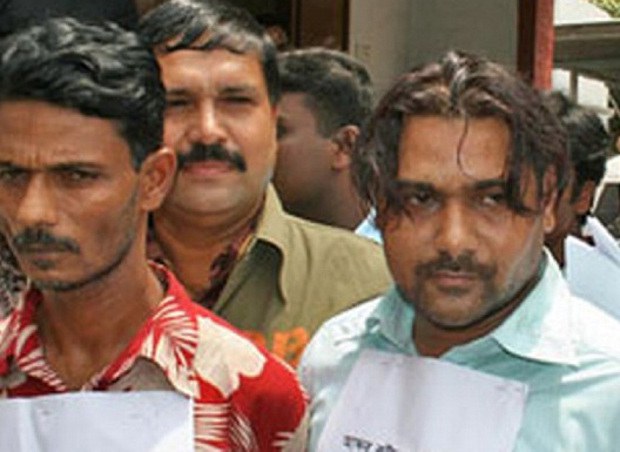Bangladesh Sends Indian Crime Figure Back Home
2016.11.11
Dhaka
 Abdul Rauf Merchant, alias Daud Merchant, (right) is pictured during his arrest at a house in Brahmanbaria district, in eastern Bangladesh, May 28, 2009.
Abdul Rauf Merchant, alias Daud Merchant, (right) is pictured during his arrest at a house in Brahmanbaria district, in eastern Bangladesh, May 28, 2009.
Bangladesh has sent home an Indian underworld figure who is an aide to a crime boss linked to the 1993 Mumbai terrorist attack after his release from a Bangladeshi prison this week, Home Minister Asaduzzaman Khan Kamal confirmed on Friday.
Abdul Rauf Merchant, also known as Daud Merchant, was handed over to authorities in India, where he was wanted over his conviction for the 1997 murder of Indian music producer Gulshan Kumar.
Merchant, a 45-year-old Indian national, was convicted and sentenced to life in prison in 2002, but was arrested and jailed in Bangladesh in 2009 after trying to flee India while on parole. Following his arrest in Brahmanbaria, a district in eastern Bangladesh, he was charged, sentenced and imprisoned for trying to enter the country illegally.
“Yes, we have handed Daud Merchant to the Indian authorities as he finished his jail term in Bangladesh. He has been a listed criminal and a dangerous person. We cannot allow such person on our land,” Kamal told BenarNews.
A police official in Mumbai confirmed Friday that the handover had taken place, saying that a team was sent from Mumbai to northeastern India to pick up Merchant after Bangladesh transferred him to the custody of the Indian border guard.
“The Bangladeshi side had informed us about Merchant's deportation, but the date of exchange was kept under wraps,” the police official told BenarNews on condition of anonymity.
“Merchant was handed over to the Mumbai Police team in Meghalaya on Wednesday night in the presence of the Border Security Force (BSF) and brought back to Mumbai on Thursday morning.”
On Friday, a court in Mumbai sent Merchant to jail after he was brought back to the city. He had served as an aide to international criminal kingpin Dawood Ibrahim, who is on the run from Indian authorities and is listed by U.S. officials as a Specially Designated Global Terrorist.
“On [the] court’s order, we have sent him to Arthur Road jail today. Now, the jail authorities will decide which jail he should be kept in for completion of his sentence,” the Indian Express newspaper quoted Joint Commissioner of Police (Crime) Sanjay Saxena.
Indian mafia lord
Dawood Ibrahim, 60, an Indian citizen and head of D Company, a South Asian international criminal syndicate, is alleged to have been behind the bombings in 1993 that targeted the Mumbai Stock Exchange and other sites in the city that left 350 people dead and more than 700 injured.
The attack was the deadliest act of terrorism in Indian history. In July 2015, India executed Yakub Memon, the sole suspect who was convicted in connection with the ’93 bombings.
Ibrahim heads D Company, a transnational syndicate that operates in India, Pakistan and the United Arab Emirates and is involved in drug trafficking, extortion, smuggling and contract killings, according to the U.S. Treasury Department.
“Dawood Ibrahim, an Indian crime lord, has found common cause with al-Qaeda, sharing his smuggling routes with the terror syndicate and funding attacks by Islamic extremists aimed at destabilizing the Indian government,” U.S. treasury officials said in 2003 when the department placed him on the terrorist list.
“He is wanted in India for the 1993 Bombay Exchange bombings and is known to have financed the activities of Lashkar-e-Taiba,” officials said, referring to a militant group that later was blamed for the 2008 Mumbai terrorist attacks that killed 166 people.
High-profile expulsions
Merchant is the second high-profile Indian national wanted by authorities to be deported by Bangladesh in the past year.
Last November, Bangladesh handed over Anup Chetia, founder of the United Liberation Front of Assom (ULFA), a northeast Indian armed separatist group, after he had spent 18 years in a Bangladeshi jail cell for illegal entry. Chetia was expelled following the signing of an Indo-Bangladeshi extradition treaty.
“We fully back the government in the extradition of criminals like Daud Merchant. We do not want terrorists and criminals to use our land for anti-state and criminal activities,” Md Suhrab Uddin, a member of Bangladesh’s Parliamentary Standing Committee on Foreign Affairs, told BenarNews.
Rohit Wadhwaney in Jaipur, India, contributed to this report.







